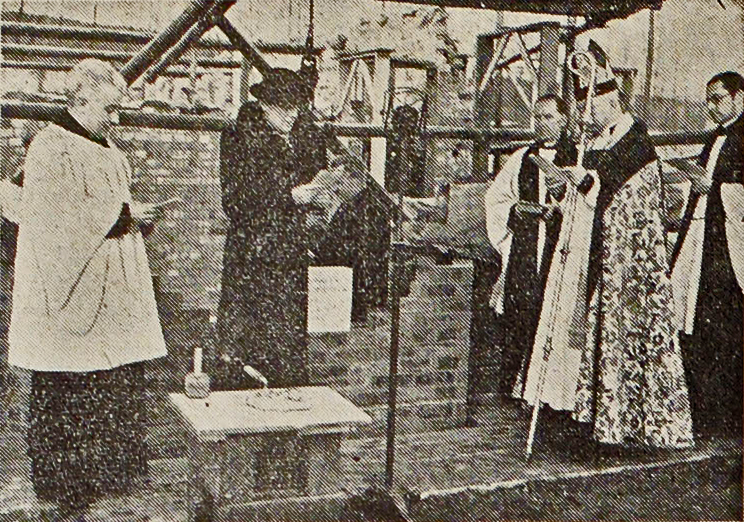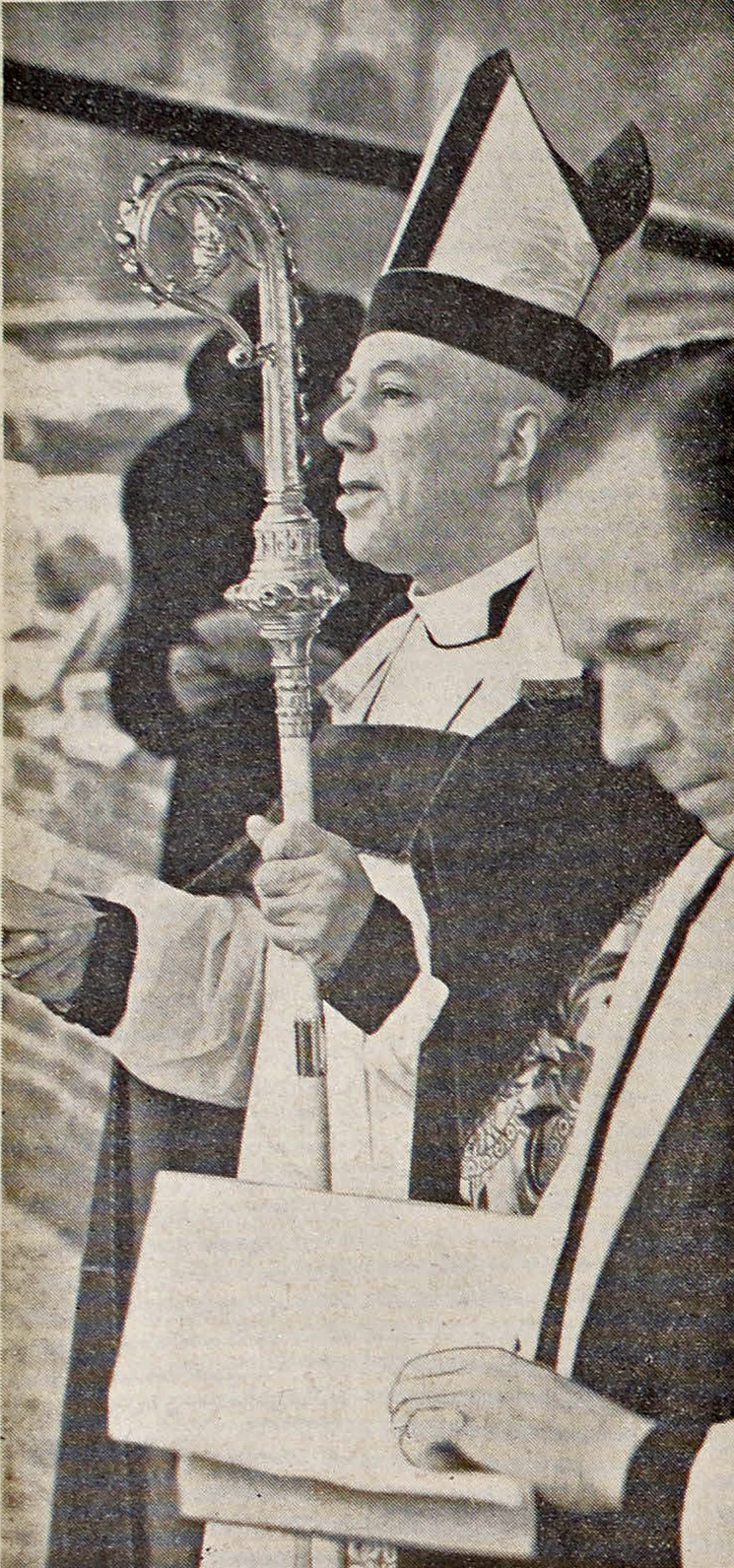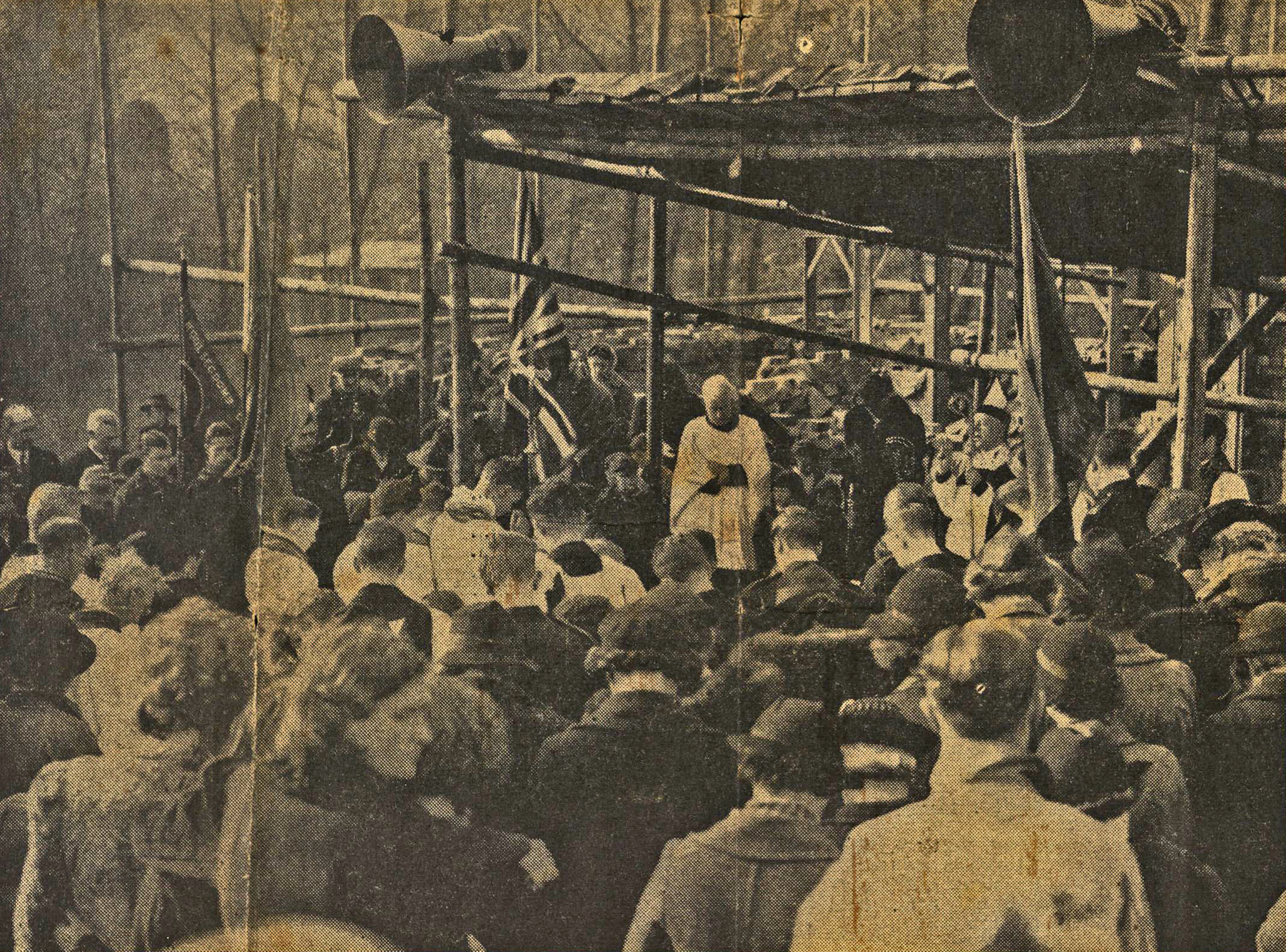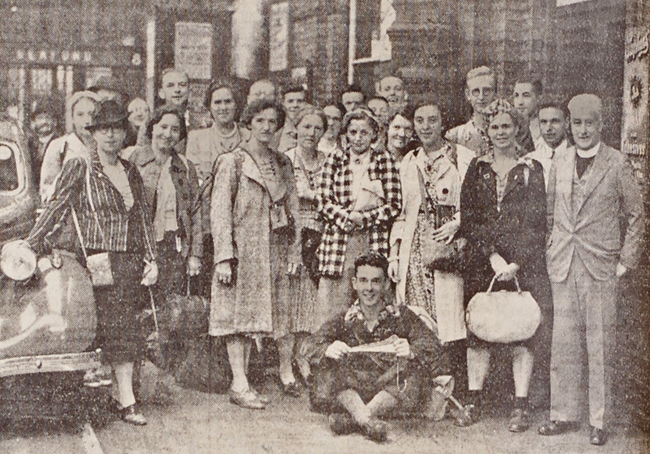
Churches - Bevendean History Project

Newspaper Articles for St Andrews Church 1939

NEW CHURCH CENTRE FOR MOULSECOMBE
Through
the generosity of Church people all over Sussex, a new Church Centre is
to be provided, at a cost of £5,000, for the people of
Moulsecombe.In the presence of the Bishop of Chichester, Dr. G. K. A. bell, the foundation stone is to be laid this (Saturday) afternoon by Miss Theodora Day, late principal of the Diocesan Training College, Ditchling Road.
Brighton & Hove Herald – 04 March 1939
Foundation Stone Laid for Moulsecombe Church Centre
“This
Church Centre, dedicated to the inspiration of St. Francis of Assisi,
who brought the spirit of Christ to the heart of poor people all the
world over, will be a centre for the family of Moulsecombe to live in
Christ.”The Bishop of Chichester (Dr. G. K. A. Bell) said this when he led the service of the laying of the foundation stone of Moulsecombe Church Centre by Miss Theodora Day, former principal of Brighton Church training College, Ditchling Road, on Saturday afternoon.

In these days of worry and anxiety, he said, the people of the world have been seeking some remedy, and we have seen the rise of the totalitarian states, of race hatred and war fever, and a vast pile up of armaments with no nation wanting war yet all afraid of each other.
Lost Road Through Life
| People turn to socialism and fascism out of despair, but they
have not provided a cure. The trouble is that people have lost the road
through life because they have trusted in the things that can be seen,
and have not looked beyond this world for their solution. The laying of the foundation stone was a symbol of magnificent achievement in the past and high hopes for the future, and the building, which is to be a kind of “religious powerhouse” the East Moulsecombe, and the social centre for a wide radius including North, South and East Moulsecombe, Coldean, Bevendean and happy Valley, will be a monument to the sacrifices of thousands of churchgoers all over the country who have helped the Sussex Church Builder’s to hand over £5000 towards it. |  |
Anonymous Gift
The
Training College (now closed) presented a further £300 towards
the building of two large committee rooms, one of which is to be
dedicated to the college, and furniture for the church, and an
anonymous gift of £500 was also received. The church will hold
about seventy, but can be thrown open to include the large hall which
will accommodate more than two hundred. It is designed by Mr L. Keir
Hett (Searle and Searle).The ceremony was attended by members of the church organisations who marched in procession from the schools, and there were many former students from the Training College, as well as Moulsecombe people. The Bishop’s chaplain, Mr W. W. S. March; the Rev. R. M. Wilson, secretary of the Sussex Church Builder’s; the Rev. A. G. Birch, vicar of Preston Parish Church; the Rev. Bransby A. H. Jones M. A.; The Rev. P. D. Allum, B. A.; The Rev. K. J. Morgan, of Moulsecombe; the hon. diocesan lay reader, Mr P. W. A. Cavell; and the churchwardens, Mr R. H. Bean and Mr C. J. Witten, were present.

Stone Laying Ceremony for St Francis Church Hall in Moulsecombe Way
Brighton & Hove Herald – 11 March 1939
THE CHURCH IN MOULSECOMBE MARCHES ON
DEDICATION OF NEW HALL BY THE BISHOP
Church
life in the big and still growing garden suburb of Moulsecombe has been
further strengthened and extended by the provision of a new church
hall, the dedication ceremony of which was performed on Sunday
afternoon by the Bishop of Chichester (Dr. G. K. A. Bell).DEDICATION OF NEW HALL BY THE BISHOP
The parish of Moulsecombe now has the parish church of St Andrew with a parish hall close by, St George’s church hall at North Moulsecombe and the new church hall in Moulsecombe-way dedicated on Sunday.
Primarily the new church hall, which is dedicated to St Francis, will serve the newly-built district of East Moulsecombe, but it will also take its share with the other church buildings of the parish in ministering to the general religious and social life of the district. It is a simple but beautiful red-brick building, designed by Mr L. Keir Hett, who was the architect of the parish church, and it is situated near a huge factory, now in course of erection, and just below the Brighton-Lewes railway line.
There are large grounds around the building and these are being levelled by the young folk of the neighbourhood with a view to their use for recreational purposes.
Children’s Welcome
The
Bishop, who came with Mrs Bell, and his domestic chaplain, the Rev. W.
W. S. March, must haver derived much encouragement for his heavy work
in the diocese by the fact that about five hundred of the children of
Moulsecombe, including Sunday School pupils and members of youth
organisations, paraded to welcome him.Dr. Bell was obviously delighted with the character of the welcome which these young people gave him and with the high hopes for the future of Church life in the district which their presence betokened.
Although St Francis hall was mainly filled with adults, it was the children assembled outside who took the chief part in the service, and it was them that the Bishop gave his address. Before he did so he led the children round the new church hall in a procession, while the hymn, “Onward Christian Soldiers,” was sung.
Dr. Bell did not preach to the children. He contented himself with narrating in outline the story of the life of St. Francis, and how his conversion and his love for the poor resulted in his relinquishing all that he might have gained for himself as the son of a rich man.
Thus told, the story made hearers realise how fitting it was that this church hall should be associated with the life of St. Francis, for Moulsecombe has experienced chapters of bitter poverty and has also known the blessings of Christian sympathy and help.
Dedication and Blessing
After
the children had sung, “He who would valiant be,” the
Bishop dedicated and blessed the building. Later, with prayers by the
Bishop and people, honour was paid to St. Francis; the prayer of St.
Francis was said and his hymn was sung.During the singing of the hymn of St. Francis, the children passed happily in procession through the hall and received the blessing of the Bishop.
The church hall, which has a beautiful window commemorating St. Francis, has cost approximately £3,000. Towards that total generous help has been given by the Hastings Rural Deanery, by the Sussex Church Builders and by the old Diocesan Training College in Ditchling Road, which has now unhappily disappeared as an educational institution.
The building has been opened for use free of debt. There will be services at the hall on Sunday evenings, which it is hoped will be linked as regards the congregation with those held at St. George’s Hall on Sunday mornings.
Those attending on Sunday afternoon included Canon G. H. Warde (vicar of Brighton), the Rev. R. M. Wilson (vicar of St. Martins, Brighton, and formerly organising secretary of the Sussex Builders), the Rev. Bransby A. H. Jones (vicar of Moulsecombe), the Revs. P. D. Allum and K. J. Morgan (curates of Moulsecombe), Miss Day (formerly principal of the Diocesan Training College), Mr R. H. Bean (vicar’s warden), Mr C. J. Witten (people’s warden), Mr A. W. Barber (organist), Mr C. W. Croucher (headmaster of the Moulsecombe Senior Boys’ School who conducted the singing), Councillor A. W. Briggs (representing the Rottingdean ward) and Councillor W. Whiting (representing the Moulsecombe ward).
Tenants Grateful to the Church
The
spontaneous action of Sussex Church people, through the lead of the
Bishop of Chichester, in finding the funds necessary to carry out the
survey and report on social and economic conditions on the three
estates, has produced a profound impression on the minds of the working
class Council tenants (writes a correspondent).A deputation of the Tenants’ Defence League, Messrs A. W. Hicks (chairman), A. Tugwell, and H. E. Bankes (hon. Technical adviser), was receive by Dr. Bell and expressed thanks to the Church and the Bishop for the practical interest focussing as it did, in no uncertain manner, public attention to the conditions under which many of the Council tenants live.
Replying to Mr Bankes, the Bishop assured the league of his continued interest in their efforts, and said that any further help the Church could give would be forthcoming.

The Bishop of Chichester (Dr. G. K. Bell) with the Vicar of Moulsecombe (the Rev. Bransby A. H. Jones) at the dedication on Sunday afternoon of St. Francis’ Hall in Moulsecombe Way.
Brighton & Hove Herald – 22 July 1939
GIRLS BORROW BISHOP’S CAR
When
the Bishop of Chichester returned to his car on Sunday afternoon after
dedicating St. Francis’ Hall, a group of little girls gathered
around him, and one of them asked, “Bishop, would you let us have
a ride in your car?”“All right,” said the Bishop happily, and about ten or a dozen kiddies clambered in the car and it was absolutely full.
“What am I going to do?” asked the Bishop of his new found friends.
Said the leader: “Bishop, you’ll have to walk!”
Dr. Bell thought so, too, and did. The little girls of Moulsecombe rode in the episcopal car; the Bishop of the diocese walked to South Moulsecombe.
Reality had been given to the story which Dr. Bell had told of St. Francis.
Brighton & Hove Herald – 22 July 1939
DUTCH VISITORS ARRIVE ON TUESDAY
A
party of Old Catholics from Holland, who will be the guests of church
people in Moulsecombe and district, will arrive in Brighton on Tuesday.
An attractive programme has been prepared in honour of the guests, who
will be received by the Mayor of Brighton (Councillor J. Talbot Nanson)
on Friday morning at the Royal Pavilion. After the Dutch visitors have
departed, a delegation of young church people of Moulsecombe will pay a
visit to the Old Catholics of Switzerland.Brighton & Hove Herald – 19 August 1939
THEY LIKE BRIGHTON’S FLOWERBEDS BUT NOT OUR BEACHES
Sixteen Dutch Old Catholics Visit Moulsecombe
As
they danced the “Lambeth Walk” at a welcoming social in St.
Francis Church Hall, Moulsecombe, on Monday evening, sixteen young
Dutch men and women on a five-day visit as guests of Moulsecombe church
people, drastically revise their opinion of the English.Sixteen Dutch Old Catholics Visit Moulsecombe
They had vaguely believed with typical continental outlook that the English were “reserved and stiff, bound up by convention and coldly indifferent to strangers and foreigners … that the English were not interested in anything beyond the weather and sport.”
It took the “Lambeth Walk” and the warm hospitality of the people of Moulsecombe to correct their illusions.
Miss Ahyzen, young, good-looking Dutch schoolmistress from Dordrecht, told the Herald reporter:
“We all thought we would find the English rather dull quiet. Instead we have found that they are charming people, perhaps reserved at first with strangers, but gay, amusing and most friendly in their homes we have received nothing but the greatest kindness.”
Parishioners of Moulsecombe church have subscribed to an entertainment funds for their guests and 16 prepared their best bedrooms to welcome the party, who are members of the Dutch Old Catholic Church.
Bonds of Friendship
The
visit is being made under a scheme to strengthen the bonds of
friendship between the Church of England and foreign churches.
Yesterday (Friday), a party of 25 left Moulsecombe to visit Switzerland
as guests of the Swiss Old Catholics. They will visit Basle, Olten,
Berne, Interlaken, Brunig, Lucerne and Zürich.There is no Gestapo in Holland. There is no need for one. Herald reporter who visited the welcoming social on Monday evening found the Dutch party strangely reluctant to discuss politics.
“Do you think there will be a war?” the Herald representative asks Meinheer P. J. Jans, young clergyman in the charge of the party. “I do not know. We are neutral. We do not think these things,” he replied.
“Are Dutch sympathies pro-British or pro-German?” the Herald asked. “The British are nice people. We have no quarrel with Germany. We are neutral.”
The Royal Baby
“Was
there a war scare in Holland” the report continued, determined
not to be put off, and the reply came: “everyone is celebrating
the birth of Princess Juliana’s baby. Flags are out and everyone
is happy. Of course it was a boy …”Beaten but still fighting, the Herald asked: “would Holland fight in a European war?” – “It is such a lovely baby,” said Miss Ahyzen, who joined the group. “Of course we would have preferred a boy, but were all very happy. ….”
The Herald retired with the knowledge that Holland is a neutral country!
The Dutch party were much more enthusiastic in discussing their opinion of England.
The Herald reporter found that they liked the rolling hills and valleys of Sussex; the placid obedience of English crowds in queues, the traffic system with automatic signals; double deck buses; the flowerbeds of Brighton town Gardens, the ancient buildings of London and Oxford; the hospitality and courtesy of the English and, of course, our wonderful policeman.
They disliked: the stones of Brighton beach; reserve of Englishmen in buses and in parks; the noise, bustle and dirt of London; the uniforms of militiamen, and intricacies of the English language.
“We are peaceable people and we want peace,” said the Mayor of Brighton (Councillor J. Talbot Nanson) when he welcomed the Dutch visitors at the Royal Pavilion yesterday (Friday).
“The activity you see around you does not mean that we want war, but if there is a war we must protect our people. The Dutch and English nations have always been good friends and I hope that they will always remain so.
“You are close to another country with which you are also friendly, and because you are nearer to them than to us you are probably more friendly than you are with us. I want you when you return home to tell what you’ve seen here – when you have the impression that we are trying to make war or to establish world peace.
“If you get an opportunity I would like you to tell also those people that other country who, because they’re not allowed to read or to hear about us here, do not know how we have been striving all these months passed for a peaceful settlement.
“We want you to be our ambassadors – to let them know that we are not warmongers but I’m taking a big hand in this gigantic problem of trying to establish peace.”
Meinheer P. J. Jans afterwards warmly thanked the Mayor for his hospitality and assured him that they, as members of a neutral nation, were working for peace in the world.

The party of Dutch Old Catholics arriving at Brighton station on Tuesday.
The party was introduced by the vicar of Moulsecombe, the Rev. Bransby Jones, who conducted a special service of Moulsecombe church of them on Thursday. Mr C. J. Whitten, on reorganising secretary of the Moulsecombe International Youth Fellowship, who entertain the visitors, was in charge of the arrangements assisted by Mr A. Howard Holt.
Refreshments were served and the party made a tour of the dome and Pavilion. The catering was by Clifford’s Brighton.
The visit of the Dutch party to Brighton is in return for a visit made by members of the Moulsecombe International Youth Fellowship to Holland last year. They have visited London, Oxford and Chichester where they were received by Bishop Dr. G. K. A. Bell, and conducted over the cathedral.
The Old Catholic Church is in sympathy with the Church of England. A member of the party, who is reporter on the Delft paper, told the Herald that within the last year reunion with the Church of England is now on a practical basis and not, as heretofore, merely a spiritual one.
Brighton & Hove Herald – 26 August 1939
The Bishop To His Clergy
The Bishop of Chichester (Dr. G. K. A. Bell) yesterday (Friday) sent the following letter to all Rural Deans in the Diocese:“I should be very grateful if you could take steps to inform the incumbents in your deanery at once, in time for the Sunday services, as follows:
“Special prayers should be offered at all services on Sunday: (a) that God may reconcile the nations now at war and that peace may be restored; (b) for all soldiers, sailors and airmen, especially our own. and all those of whatever land who are exposed to special peril; (c) for their homes and families; (d) for the Prime Minister and the Government; (e) for all suffering in mind and body; (f) for the children and others who have come into the diocese from London.
“All congregations should be asked to remember the continued unity of all Christian people in allegiance to Christ In spite of the divisions caused by hostility or war,
“A special word of welcome should be said in cases in which children have been evacuated from London.
“Special short intercession services should be arranged on weekdays.
“Churches should be kept open on weekdays as well as Sundays.
“The clergy are asked to do their best to visit all those from whose homes men have joined up.
“The clergy are asked to co-operate fully with the civil authorities in the care of the children, and should provide opportunities of worship and instruction for the children.
“Further instructions will follow.”
Brighton & Hove Herald 2 September 1939
DECLARATION OF WAR
I
am speaking to you from the cabinet room at 10 Downing Street. This
morning the British ambassador in Berlin handed the German government a
final note stating that unless we heard from them by 11 o'clock that
they were prepared at once to withdraw their troops from Poland, a
state of war would exist between us. I have to tell you now that no
such undertaking has been received, and that consequently this country
is at war with Germany.Neville Chamberlain's radio broadcast on 3 September 1939 at 11 a.m.
You can imagine what a bitter blow it is to me that all my long struggle to win peace has failed. Yet I cannot believe that there is anything more, or anything different, that I could have done and that would have been more successful. Up to the very last it would have been quite possible to have arranged a peaceful and honourable settlement between Germany and Poland. But Hitler would not have it. He had evidently made up his mind to attack Poland whatever happened, and although he now says he put forward reasonable proposals which were rejected by the Poles, that is not a true statement. The proposals were never shown to the Poles, nor to us, and though they were announced in the German broadcast on Thursday night, Hitler did not wait to hear comments on them, but ordered his troops to cross the Polish frontier the next morning.
His action shows convincingly that there is no chance of expecting that this man will ever give up his practice of using force to gain his will. He can only be stopped by force.
We have a clear conscience. We have done all that any country could do to establish peace. But the situation in which no word given by Germany's ruler could be trusted, and no people or country could feel itself safe, had become intolerable. And now that we have resolved to finish it, I know that you will all play your part with calmness and courage.
Neville Chamberlain's radio broadcast on 3 September 1939
WAR AND THE CHURCH AUTHORITIES
Whole Aspect of Parishes Changed
The
announcements made in some Sussex churches on Sunday of provisional
arrangements to deal with the problems which would confront Church
authorities in the event of war must have reminded the older generation
of worshippers of the many ways in which the work and worship of Sussex
Church folk were affected by the war of 1914-18.Whole Aspect of Parishes Changed
So far as actual material damage was concerned Sussex churches—unlike some of those in London and other more vulnerable areas—escaped scot free. Nevertheless there was no parish so remote as not to experience to some extent the greater tragedies of war, of which we are still reminded by our countless village war memorials, as well as minor repercussions of the conflict in the form of social restrictions and economic hardship.
The whole aspect of many parishes was entirely changed, and the Church was faced with the enormous task of doing what it could with the most inadequate resources to provide for the spiritual needs of the troops whose presence transformed normally peaceful parishes like Seaford, Shoreham and Maresfield into huge camps.
Providing Chaplains
There
was, too, the problem of providing chaplains not only for the ordinary
hospitals largely given over to the wounded but for the many temporary
hospitals into which most of the larger country houses in the diocese
were converted.Something like £7,000 was spent in providing “camp churches” in different parts of the county out of diocesan funds, but this sum represented but a small part of the total amount provided by individual Churchmen to meet the financial needs of the day. The inevitable concentration of effort on meeting emergency needs necessarily meant an almost entire “hold-up” for the time being of the extensive schemes for the extension and reorganisation of Church work in the diocese which had been put in hand by the then Bishop of Chichester (Dr. C. J. Ridgeway), and even ordinary parochial activities were grievously crippled.
Church Army and Y.M.C.A.
The
number of clergymen entirely or partly withdrawn from their ordinary
duties in the diocese to serve as chaplains in the Navy or Army
totalled by July, 1918, no fewer than 84, while a further 82 had been
commissioned for this work before the end of the war.In addition, many rendered valuable help in the excellent work undertaken by the Church Army and the Y.M.C.A. for the spiritual and material welfare of the troops.
Those to whom fell the less spectacular task of endeavouring to keep alive the spirit of Christianity amid the welter of angry passions and prejudices which war always creates found abundance of work ready to their hands in their home parishes, and if, here and there, some of them succumbed to the temptation to place their “patriotism” beyond dispute by adopting “for the duration” a somewhat expurgated version of the New Testament, theirs was a fault which, in those days, overtook not a few of those who occupied more exalted positions than that of a parish priest.
Brighton & Hove Herald 2 September 1939
